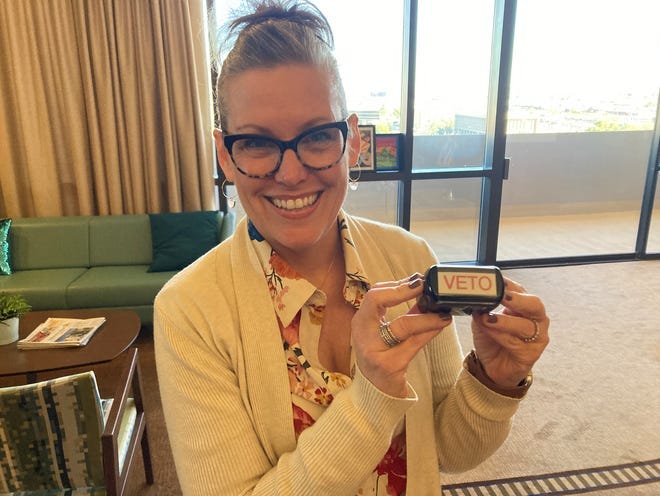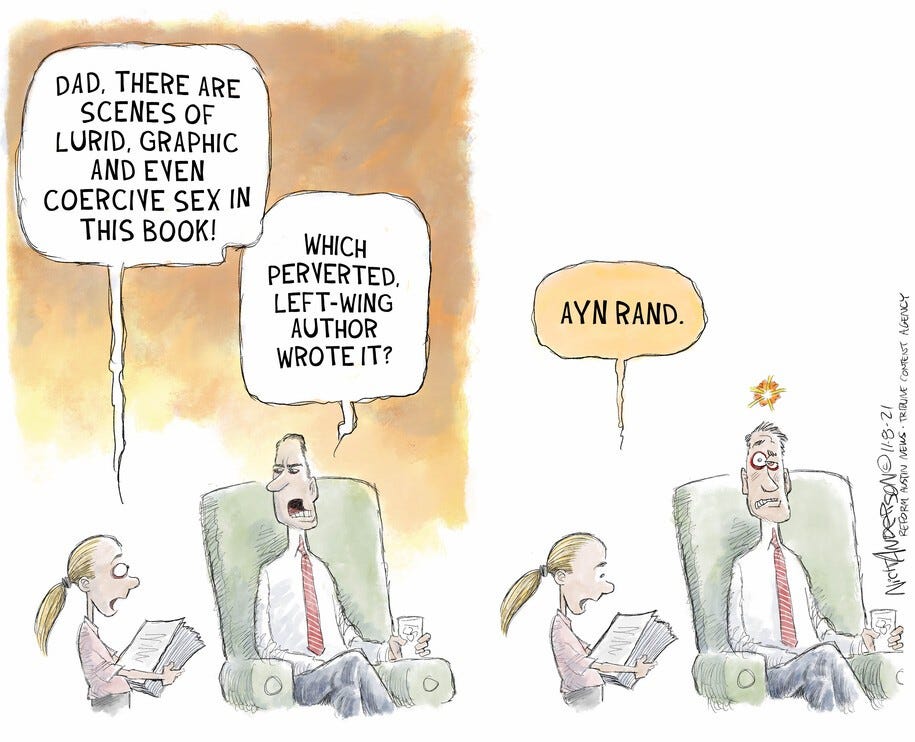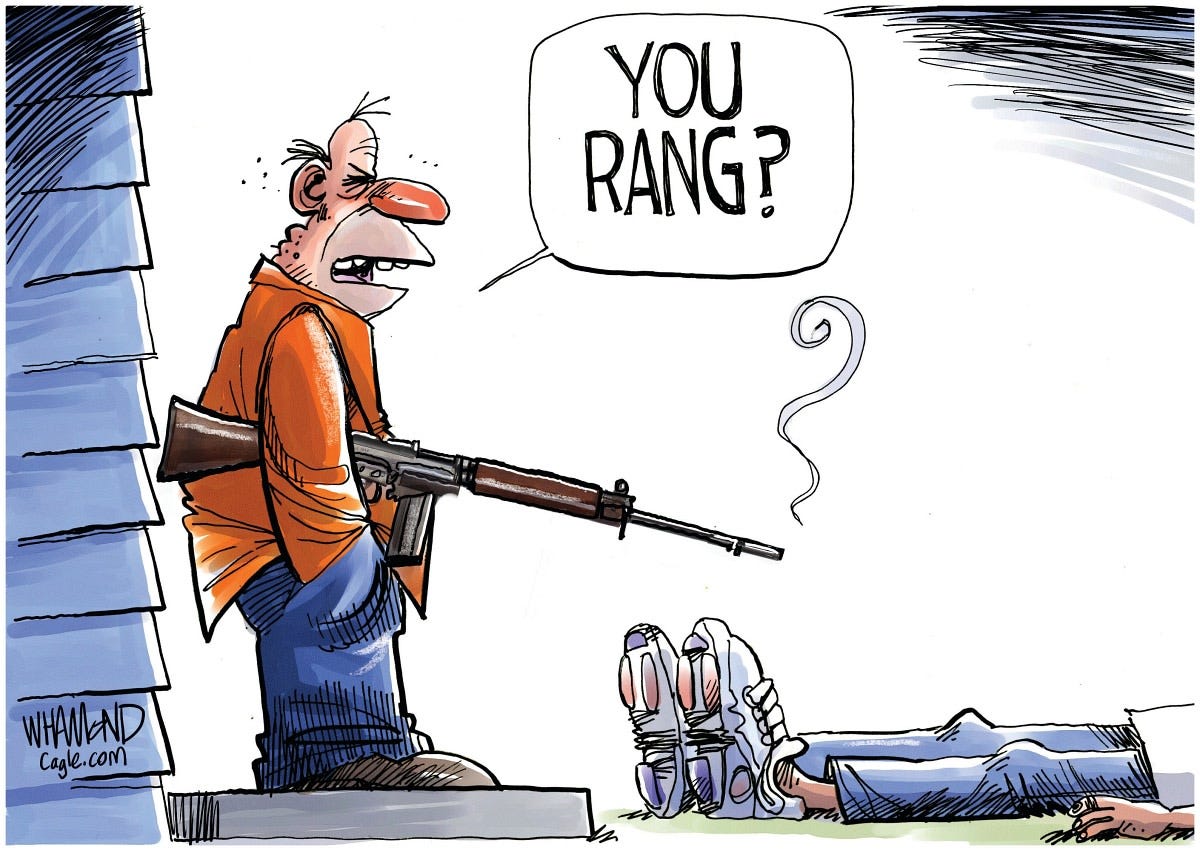CEBV Weekly: April 8, 2024
Arizona's budget negotiations are finally under way. Has anyone checked the couch cushions?
Elect clowns, expect a circus. Many of this session’s most contentious bills are passing along party lines, with only Republican votes in support, and moving up to the governor’s desk for her signature or veto. As you’d expect, Hobbs is taking one look at the rash of culture-war nonsense they’re sending her and saying no thanks. See the “Veto Watch” section below for more.
A one-day work week. GOP House Speaker Ben Toma (R-27) and Senate President Warren Petersen (R-14) announced that, since most of their legislative work is done for the year, they’ll bring lawmakers in only one day per week until a budget is negotiated. Both the House and Senate will gavel in again on Wednesday. CEBV is still tracking roughly 90 bad bills this session, 15 of which are ballot referrals.
Unnatural optimism. Toma and Petersen also announced they hope to end the 2024 legislative session within four weeks. Even though budget meetings with Gov. Katie Hobbs began on Tuesday, the two sides don’t agree on much. Not only do they not agree on how much to spend, but they don’t even agree on how much money the state has. (The Legislature’s Joint Legislative Budget Committee analysts estimate the deficit at $1.7 billion.)
“Getting to an agreement will be a hard lift this year, because a massive budget deficit means cuts, and lots of them. And there’s new spending that needs to be squeezed in as well, including more than $100 million to meet a federal judge’s order to improve prison health care and a projected $450 million boost for the state’s Medicaid program.” (Arizona Capitol Times, April 6)
Problems of their own making. Updated budget projections come out April 11. For our part, we’ll be watching the Finance Advisory Committee meeting with great interest, but we won’t be holding our breath. GOP leaders have been unwilling to come to terms with the fact that Arizona’s $1.7 billion deficit is structural and of their own making, not a one-time blip. Until that happens — or until Arizona gets a new, more reasonable legislature — all of this is just window dressing.
The revolving door keeps spinning. On Thursday, the House of Representatives swore in Deborah Nardozzi (D-8), giving Democrats a full caucus. However, that only lasted about 6 hours; at the end of the day, Marcelino Quiñonez (D-11) abruptly resigned. Democrats in District 11 will now meet to nominate three candidates for Quiñonez’s seat, and the Maricopa County Board of Supervisors will select one of those three to serve the remainder of his term.
Not just resignations. Meanwhile, House Speaker Pro Tempore Travis Grantham (R-14) and Senate Majority Whip Sine Kerr (R-25) are on their way out. Arizona’s term limit law specifies four consecutive sessions served in either the House or Senate; rather than switching chambers as has become customary, both lawmakers chose not to run again. Also leaving the Legislature in January are mother-daughter MAGA duo Barbara Parker (R-10) and Jacqueline Parker (R-15), neither of whom filed paperwork to run for re-election.
⏰ If you have 10 minutes: Arizona desperately needs a different legislature! Find the competitive legislative district nearest you1, then sign up to volunteer for, or donate to, the candidates that best represent your values.
⏰⏰ If you have 30 minutes: Contact Gov. Hobbs and ask her to veto one or more of the bad bills headed to her desk (see the “Veto Watch” section below).
⏰⏰⏰ If you have 60 minutes: Join us on Zoom at 4pm on Sunday for our next CEBV Happy Hour conversation. This week we’ll feature a union panel: Bill Ruiz from Carpenters and Molly McGovern from UFCW. We’ll meet every Sunday at 4 PM through the end of session. Sign up in advance here.
The veto machine has started up again! This past week, Gov. Hobbs exercised her power to protect Arizonans from the following harmful, CEBV-opposed legislation.

Vetoes, Tuesday 4/2
SB1073, Kavanagh (R-3), making it a class 6 felony for protesters to block a highway, bridge or tunnel for more than 15 minutes in an attempt to criminalize protests, which are a First Amendment right
HB2019, Griffin (R-19), allowing anybody to challenge Arizona Department of Water Resources groundwater level reports in service to corporations building groundwater-reliant subdivisions
HB2123, Smith (R-29), banning Arizona from requiring water measuring devices for many rural wells, preventing measuring of rural groundwater levels and contributing to continued overpumping
HB2183, Willoughby (R-13), stripping minors of their right to medical privacy by requiring health care entities to give parents access to all of their minor children’s medical records
HB2271, Parker (R-10), creating a special vehicle license plate for out-of-state private religious educational institutions
HB2375, Lupe Diaz (R-19), preemptively banning Universal Basic Income, a program which Jake Hoffman (R-14) compared to feeding bears
HB2502, Biasiucci (R-30), imposing training and work requirements on “able-bodied” SNAP recipients, which would make it harder for Arizonans in need to pay for food
HB2503, Biasiucci (R-30), barring DES from applying for work requirement waivers on behalf of “able-bodied” SNAP recipients, which would make it harder for Arizonans in need to pay for food
HB2629, Toma (R-27), requiring schools to teach students that communism is bad by mandating specific, ideologically biased curriculum
On the Governor’s Desk
GOP lawmakers passed the following 23 bills, which CEBV opposes, this week. They now await Gov. Hobbs’ veto.
SB1007, Hoffman (R-15), jailing Arizona public school teachers (but not teachers at ESA-funded private schools) for up to two years for teaching material that lawmakers consider too “sexually explicit,” and banning public libraries from exposing minors to "sexually explicit materials." Effectively a book ban which would prevent Arizona's students from getting a well-rounded education.
SB1060, Mesnard (R-13), allows partisan observers inside the voting process on behalf of federal candidates, including during setup when other observers and the public are not permitted, in the name of “transparency.” This muddies a cleanly working process and could weaken confidence in our state’s elections.
SB1097, Wadsack (R-17), would make school board elections partisan, transforming them into another venue for extremist conflict.
SB1146, Kern (R-27), would allow meat, poultry and seafood products made from animals that were not given a mRNA vaccination to be labeled "mRNA free." Driven by a false conspiracy theory that mRNA vaccines have entered the US food supply.
SB1151, Kern (R-27), would allow public schools to post and read aloud the Ten Commandments in classrooms, as well as offer “neutral Bible study” classes in high school. David Cook (R-7) noted in committee the bill’s constitutionality issues, but voted for it on the floor anyway.
The Arizona Constitution on religion and public schools:
Article 9, Section 10: “No tax shall be laid or appropriation of public money made in aid of any church, or private or sectarian school, or any public service corporation”
Article 11, Section 7: “No sectarian instruction shall be imparted in any school or state educational institution that may be established under this Constitution”
SB1153, Kern (R-27), would ban Arizona agencies from creating rules that would increase regulatory costs by more than $500,000 over 5 years. The Legislature would instead be required to enact legislation to ratify the proposed rule into law. This would kneecap the state’s ability to regulate unaccountable or wasteful spending, such as with universal ESA vouchers.
SB1182, Kavanagh (R-3), is a shower-only version of last year’s “bathroom bill” that would ban trans kids from using showers at school that align with their gender identities, in violation of the US Constitution and Title IX.
SB1189, Wadsack (R-17), would ban cities from prohibiting or regulating gun shows within their boundaries. Unregulated gun shows can be a magnet for traffickers to obtain large quantities of weapons without background checks. Guns purchased at gun shows are much more likely to be used in criminal activity.
SB1299, Kern (R-27), would make it harder to ban motorists from turning right on red lights by requiring a state engineer to submit specific paperwork. Any right-on-red ban must already be approved by an agency traffic engineer. Based on a conspiracy theory that banning right turns on red is “part of the agenda to make driving as miserable and as difficult as possible so people don’t drive so much.”
SB1330, Mesnard (R-13), removes the word “drop box” from elections statute, replacing it with “container” or “ballot box.” This could enable restrictions on drop boxes themselves and even the process of mail-in voting.
SB1366, Bolick (R-2), would add blockchain (related to cryptocurrency) to Arizona’s “regulatory sandbox,” deregulating a volatile playground for the mega-rich.
SB1369, Bolick (R-2), would require public schools to post student demographic information meant for federal education officials and complete a newly created ADE survey on bullying and other school safety issues. Public schools are already subject to many laws on discrimination and bullying, making this an excessive overreach. Meanwhile, bills to expand these protections to kids at ESA voucher-funded schools go unheard.
It takes CEBV many hours each week to produce this resource.
Your donations fuel our work!
SB1628, Kerr (R-25), would eliminate legal recognition of transgender people by removing reference to gender in Arizona law. The bill is being pushed by the evangelical Christian lobbyist group Center for Arizona Policy.
HB2178, Kolodin (R-3), would allow students at Arizona’s public universities to opt out of funding specific clubs with their student activity fee. This would harm the free exchange of ideas on campus, instead encouraging censorship on difficult topics.
HB2393, Kolodin (R-3), would allow political parties to opt out of the publicly administered presidential preference election and instead choose their nominee via their own private voting process. This privatizes elections and does not guarantee secure electronic voting by overseas military as is currently allowed.
HB2504, Biasiucci (R-30), limits insurance coverage for genetic sequencing and transplants for companies “associated with a foreign adversary.” Prohibits research and health care institutions from doing genetic sequencing if a piece of the machine was produced in China or Hong Kong. An issue best dealt with at the federal level.
HB2586, Dunn (R-25), would require “age and identity verification” for companies that provide “material harmful to minors” over the internet. Users must be at least 18, or companies would be subject to civil penalties. A district court blocked a similar law in Texas on grounds that it violates First Amendment rights and is overly vague.
HB2612, Dunn (R-25), bans people from holding elected public office in Arizona if they have been convicted of the crime of collecting early ballots. Those prosecuted in Arizona for this so-called “ballot harvesting” include a 66-year-old grandmother who went to jail for 30 days for helping 4 of her neighbors vote.
HB2658, Chaplik (R-3), would ban pedestrians from soliciting donations on a painted or raised traffic island or median. Panhandling bans criminalize homelessness, making the problem less visible rather than tackling underlying social issues.
HB2788, Jones (R-17), would ban Arizona, its cities and counties, and its public schools from adopting the UN goals for sustainable development. These goals include tackling substantive issues such as extreme poverty and hunger, quality education, gender equality and climate change.
HB2793, Pingerelli (R-28), would require public schools to restrict student access to the internet, including social media, and limit students’ use of phones during the school day to educational purposes or emergencies. Schools should be allowed to set their own policies and not struggle under top-down legislative mandates.
HB2843, Heap (R-10), creates a license to shoot migrants by allowing Arizonans to use deadly force against people on their land. This would allow ranchers to legally shoot and kill undocumented immigrants crossing their property, or even people who ring their doorbell (as happened in Missouri).
HB2852, Heap (R-10), would stop Arizona from participating in ERIC, a multi-state system that weeds out duplicate, deceased or suspicious voter registrations. The ERIC system is one of the strongest safeguards against voter fraud for election officials; there’s no viable replacement.
2024 Session Timeline
These “deadlines” are highly flexible and can be changed or waived at any time with a simple majority vote.
Tuesday, 4/16 100th Day of Session (the stated end goal; can be changed) Sunday, 6/30 Constitutionally mandated deadline for a state budget
Flag this handy list of contact info, committee chairs and assignments, updated for 2024.
Bookmark CEBV’s Linktree. Want to attend a Civics, Persuasion, Testimony, RTS or other training? Ready to register for an upcoming Spotlight Conversation or view a past one? Need to stay informed? Looking for our social media, inspiration, or self-care tips? It’s all here on our Linktree:















